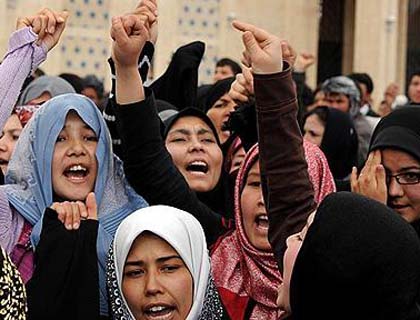“My love will gather us both together on the day of resurrection. Brutes have placed stones between us in this world.” Rahila Moska, a young Afghan woman poet from Helmand.
On April 8, 2010, Rahila Moska, who was 16, committed suicide after her parents had caught her, once again, reading one of her love poems over the phone. Her parents assumed there was a boy on the other end of the line, not a girl named Ogai, who was also a poet and a member of Moska’s weekly poetry group of 40 women. Although Moska wasn’t allowed to attend in person, her parents had pulled her out of school; she called in on the phone to share her powerful two-line poems called landai – traditional Pashto poems that criticize the social order and a woman’s lot within it.
These poems, centuries old, are often written in secret. Landai believes the idea that the 12 million Pashtun women of Afghanistan and Pakistan are submissive or defeated. As Sahira Sharif, and Afghan MP from Khost province, puts it, “Most Pashtun women are not allowed to express their emotions in society, not even in poems. But the spirit to raise their voice is always alive in them.” in 2008, Sharif founded an organization in Kabul called Mirman Baheer, a social group that revolves around women’s poetry. The group meets on Monday nights in Kabul, but has sprouted what it calls “cells” in more than eight provinces where the women sometimes meet in secret.
After the Soviet invasion of Afghanistan in 1979, and due to the horrific slaughter, terror and destruction that ensued, the Landais take on a more tragic, heart-wrenching expression, particularly in their themes of exile, loss and love of the home country such as: “My beloved, my sun, rise above the horizon and obliterate my nights of exile. The darkness of solitude cloaks me from all sides. Living in this land of exile is ravaging my heart. May God let me return to the foot of my tall mountains!” Hence, Landais reflect the emotions of Afghan women and their state in the country.
The truth is that a backlash against women rights campaigns started back in 2001 after the overthrow of the Taliban. Its first public face was the young TV presenter Shaima Rezayee. Accused of flirting on TV, the music show presenter was found shot dead in 2005. The murder was never fully investigated but rumors abounded that hers was a Taliban murder or maybe an “honor killing”. That these two possibilities could be expressed in one breath showed that the misogyny of the average Afghan family was perhaps not vastly different from that of a Taliban state.
Shaima’s killing made it clear: if there was another part that was ready to suppress them. Women soon discovered that the enemies of women’s rights were as omnipresent as dust, god and corruption. Neologisms such as “the Talib in suits” or “the tie-wearing Talib” were coined to sum up encounters with misogynist men dressed up as progressives. Some of them held PhDs. Others were Fulbright scholars. But a university degree was not guarantee for a progressive mind.
Most violence against women in Afghanistan is within the family, so the new law means it will be impossible to prosecute cases.
A new Afghan law will allow men to attack their wives, children and sisters without fear of judicial punishment, undoing years of slow progress in tackling violence in a country blighted by so-called "honour" killings, forced marriage and vicious domestic abuse.
The small but significant change to Afghanistan's criminal prosecution code bans relatives of an accused person from testifying against them. Most violence against women in Afghanistan is within the family, so the law – passed by parliament but awaiting the signature of the president, Hamid Karzai – will effectively silence victims as well as most potential witnesses to their suffering.
"It is a travesty this is happening," said Manizha Naderi, director of the charity and campaign group Women for Afghan Women. "It will make it impossible to prosecute cases of violence against women … The most vulnerable people won't get justice now."
Under the new law, prosecutors could never come to court with cases like that of Sahar Gul, a child bride whose in-laws chained her in a basement and starved, burned and whipped her when she refused to work as a prostitute for them. Women like 31-year-old Sitara, whose nose and lips were sliced off by her husband at the end of last year, could never take the stand against their attackers.
"Honour" killings by fathers and brothers who disapprove of a woman's behaviour would be almost impossible to punish. Forced marriage and the sale or trading of daughters to end feuds or settle debt would also be largely beyond the control of the law in a country where the prosecution of abuse is already rare.
It is common in western legal systems to excuse people from testimony that might incriminate their spouse. But it is a very narrow exception, with little resemblance to the blanket ban planned in Afghanistan.
I do justify Afghan women who marched in Kabul on Thursday to protest violence against women and decry the new draft law that activists say will severely limit justice for victims of domestic abuse.
Legal experts say the law would seriously curb prosecutions involving violence against women, where relatives are often the only witnesses.
In practice, legal experts add, it would mean that a woman cannot testify that her uncle raped her, that a mother who sees her daughter beaten by her father or brother cannot testify, and that family members witnessing a young woman being forced into marriage by her father cannot be used in a prosecution.
I hope that patriarchy and radical ideologies will be changed regarding women in our society and women do not fall victim to domestic and social violence any more. May that day won’t be long.

